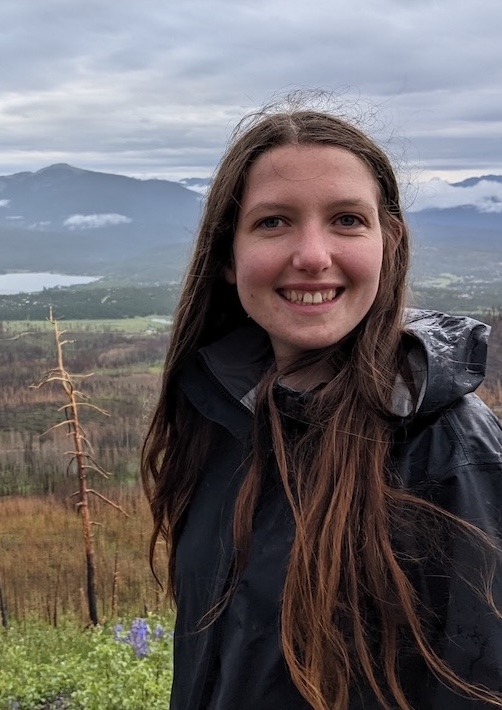
I'm a fifth-year PhD student in biology with an emphasis in ecology, evolution, and organismal biology (EEOB) at the University of Utah in Salt Lake City, UT. My research focuses on plant ecophysiology, the intersection between plants and their environment. Specifically, I'm interested in better understanding how anthropogenic drought and wildfire will impact the forests of the future.
Current Research
My PhD is advised by Dr. William R.L. Anderegg, whose research focuses primarily on the impacts of global change on forest ecosystems worldwide. Dr. Anderegg is an associate professor in the School of Biological Sciences at the University of Utah, as well as the director of the Wilkes Center for Climate Science & Policy at the University of Utah. My graduate work in the Anderegg Lab aims to use a combination of field and laboratory ecophysiology to understand what factors impact how forests respond to drought, with a specific focus on how fire impacts tree drought physiology.
Field research in southwestern Colorado
A large portion of my dissertation research focuses on the direct impacts of wildfire on mature forest ecosystems on multi-year timescales. This portion of my dissertation involves field research on the impacts of wildfire on tree physiology and functional traits in the San Juan National Forest in southwestern Colorado, which experienced large wildfires and record-breaking drought in summer 2018. My observational study spans plots across three forest types (ponderosa pine, quaking aspen, and Engelmann spruce-subalpine fir) in burned and unburned regions of the San Juan National Forest. I've presented this work at multiple conferences, including AGU 2022, ESA 2023, the 2024 GRC Multiscale Plant Vascular Biology conference, and the 2025 Xylem Conference in Sevilla, Spain in March 2025. A manuscript of this research is currently in preparation. If you have any questions about this project, please feel free to shoot me an email!
I've also collected two years of data on a project looking at how time since fire impacts hydraulic physiology in a ponderosa pine forest near Mancos, CO that burned in a wildfire in May 2024. I plan to present this in-progress data at the 2025 AFE conference and continue to collect data at this site for 1-2 more years.
Dose-dependant smoke impacts on leaf physiology
In addition to my research on the direct impacts of wildfire on tree physiology, I'm also interested in the more indirect impacts of smoke from wildfire on leaf photosynthetic health. I'm currently working on a project using a controlled smoke chamber to investigate the dose dependence of smoke impacts on subalpine fir and quaking aspen seedlings.
Past smoke research in Fishlake National Forest, Utah
Undergraduate Research
As an undergraduate student, I worked closely with Dr. Aaron Ramirez, Associate Professor of Biology-Environmental Studies at Reed College. Our largest project aimed to elucidate the effects of elevation and slope aspect on the drought physiology of Bigcone Douglas-fir (Pseudotsuga macrocarpa), a rare conifer endemic to the steep, arid mountains of Southern California's Transverse Range. My first-author paper on this research, "Integration of landscape-level remote sensing and tree-level ecophysiology reveals drought refugia for a rare endemic, bigcone Douglas-fir" combined field ecophysiology data that I collected with satellite remote sensing data and was published in August 2022 in Frontiers in Forests and Global Change.
The Smart Trees Project is a recent collaboration among several colleges and universities in the Portland Metropolitan Area that aims to address the question of how trees native to the Pacific Northwest are responding to warmer urban temperatures. To do so, researchers involved in the project have established three field sites along an urban-to-rural gradient: "warm-urban" site in suburban Southeast Portland, a "cool-urban" site at Powell Butte, and a "cool-rural site" near Sandy, OR. As part of the Reed College collaboration on the project, headed by Dr. Ramirez and then-NSF Postdoctoral Fellow (now professor) Dr. Hannah Prather, I assited in collecting data on drought stress (water potential), drought acclimation (construction of vulnerability curves), and some data analysis of temperature data from the equipment installed in the canopies of Douglas-fir trees at the project field sites. Most of the data collection has been focused on the tree species Douglas-fir (Pseudotsuga menziesii), a widespread and important forestry tree in the Pacific Northwest. However, the study has now began to branch out (pun intended) into exploring the health of two other native tree species, Western Red Cedar (Thuja plicata) and Bigleaf Maple (Acer macrophyllum).
As a senior at Reed College, I also spent two semesters working with Dr. Ramirez to design and carry out an experimental undergraduate thesis. I explored whether three species of trees native to the Pacific Northwest (Douglas-fir, Bigleaf Maple, and Coast Redwood (Sequoia sempervirens)) are capable of absorbing water through their bark in order to reduce drought stress. If you're at all interested in my thesis work, you can read my thesis here.
Prior to Dr. Ramirez joining the Department of Biology at Reed, I worked for Dr. Keith Karoly in the Reed Herbarium as a part of the Marttala Memorial Fellowship. I learned to prepare, mount, and database herbarium specimens. Some of the finished specimens were placed in the Reed Herbarium, but most went to PSU. All of these specimens and more can be found online at the Consortium of Pacific Northwest Herbaria website.
Science Education and Communication
I believe it is incredibly important to make scientific research accessible to non-scientists, and my experiences with science communication have helped me to develop skills in communicating concepts clearly and concisely. I hope to continue improving my skills to effectively communicate my research to as broad an audience as possible.
I recently had the opportunity to present a guest lecture on wildfire at the Utah State Prison with Dr. Katharine Walter, a professor of environmental epidemiology who also teaches a course on Climate Change and the American West through the Utah Prison Education Program (UPEP) program.
As an undergraduate student, I spent three years working as an editor and writer for The Reed College Quest, the campus student-run newspaper that publishes weekly during the academic year. I worked with a team of student editors to recruit student writers, lead weekly writers' meetings, contribute articles, and edit and lay out the newspaper each week. Many of the articles that I wrote, from November 2018 onward, can now be found online.
During my last two years at Reed, I also worked as a student teacher through the Reed College Science Outreach Program. Together with my teaching teams of one to two other students, I planned and taught weekly lessons to fourth- and fifth-grade students at underfunded elementary schools in Portland. These lessons focused on exploring basic scientific concepts, including the water cycle, food webs, and the greenhouse effect, through the lens of climate change. I hope to be able to use my experiences teaching science through this program to be an even more effective teacher in the future.
